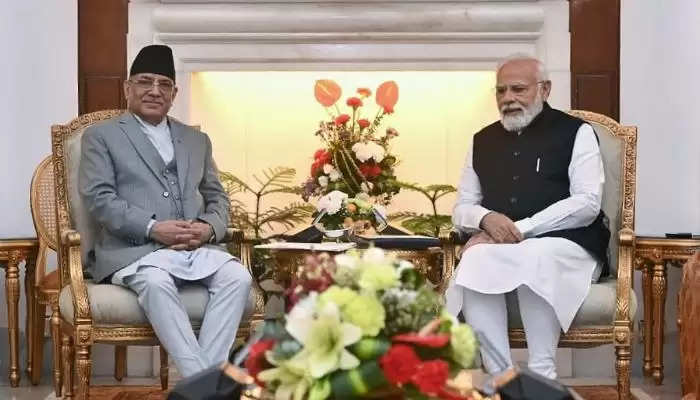Nepal's Prime Minister Prachand meets with Prime Minister Modi in Delhi to sign several agreements, and Nepal changes its citizenship law, which may enrage China.
A change to the citizenship statute was granted by Ramchandra Poudel, the president of Nepal, just hours before the visit of the Nepalese prime minister to India. According to this rule, foreign women who marry Nepali residents are automatically given citizenship.

At the meeting, both leaders signed a number of agreements. In the interim, a change to Nepal's citizenship law has been authorised. This is viewed as going against China's position. On June 1, 2023, Prime Minister Modi and Prachand officially opened the Integrated Checkpost at the Nepal-India border close to the village of Kewatlia in Sonauli, India, and Bhairahawa, Nepal. Also, they launched the e-project for the railway's Kurtha-Bijalpura stretch.
The Motihari (East Champaran)-Amlekhganj oil pipeline connecting India and Nepal was officially opened by both presidents. The Indian Railways cargo train from Bathnaha to the Nepal Custom Yard was also flagged off by them. They also agreed that diplomacy should be used to settle border problems.
Prime Minister Narendra Modi remarked, "I remember my first Nepal visit just after three months of assuming office (as PM) nine years ago," while speaking at the joint press conference. I provided a "HIT" formula at the time for India-Nepal relations. Highways, I-ways, and Transways were what it was. I had previously stated that we will connect India and Nepal in a way that would prevent our respective borders from acting as a barrier. Trucks shouldn't be used to export oil; trains should. On the common rivers, bridges ought to be constructed. It is necessary to make preparations for Nepal to export electricity to India. Friends, I'm delighted to report that our relationship has been successful after nine years.
The construction of bridges over their shared rivers and the export of power from Nepal to India are just two of the key projects that the two nations have been working on over the past nine years, according to PM Modi. In Birgunj, the initial INo Nepali citizen will be denied the opportunity to become a citizen, according to a clause in the amended constitution. Moreover, citizenship through descent and naturalisation are both provided for. Moreover, citizenship certificates will be given to youngsters whose parents' locations were unknown. According to the change, after the mother makes a statement, children born to a Nepali mother but whose father is absent could receive citizenship documents.ntegrated Checkpost was set up. Along the border, efforts have also been made to start the first petroleum pipeline, railway, and transmission. From Nepal, India is importing 450 megawatts of electricity.
Pushpa Kamal Dahal, the prime minister of Nepal, was quoted as saying, "Efforts are being made jointly to strengthen connectivity between India and Nepal. Dialogue will be used to settle the boundary conflict between the two nations. India has helped Nepal in a number of areas, including agriculture.
Nepal updated its nationality laws.
A change to the citizenship statute was granted by Ramchandra Poudel, the president of Nepal, just hours before the visit of the Nepalese prime minister to India. This law grants immediate citizenship and political rights to foreign women who marry Nepali citizens.
The reason this measure has been on hold for so long is because China opposes it. About this law, China has warned Nepal. China claims that if this bill is passed, Tibetan refugees and their families may be granted citizenship and property rights. After India, Nepal is home to the most Tibetan refugees.
Nepal did hesitant to adopt this law change because of China's influence, in fact. An revision to the citizenship statute was twice rejected by Nepal's former president, Bidya Devi Bhandari. At the time, there was also the rumour that China's influence was the reason she had not granted her permission.
The bill was approved by the Nepalese parliament last year, but Bidya Devi Bhandari, the country's previous president, repeatedly declined to validate it, sending it back to the chamber for more discussion. Following its return the first time, the law was once again passed by both chambers of parliament without taking the president's recommendations into account, and it was again forwarded to the president for approval. After that, the prior president failed to approve it within the allotted 15 days. After retiring,
The amendment will make it possible for thousands of children whose parents were naturalised to become citizens by descent. Prior to April 12, 1990, everybody born in Nepal was eligible to get citizenship via birth. Unfortunately, because there was no statute allowing for citizenship by descent, their children were not granted citizenship.
India and Nepal's prime minister, Pushpa Kamal Dahal, are particularly close.
India and Nepal's Prime Minister Prachand have a history of cooperation. Along with a number of other Maoist comrades, he participated in armed uprisings against the monarchy of Nepal. They were supported at that time not just by left-leaning organisations in India but also by the Indian government. All three of Prachand's daughters had secret marriage arrangements made for them in India.
Prachand started an armed uprising against the monarchy in Nepal in 1996. Yet, as the Maoists began to attack Nepali citizens, popular hostility towards them increased. India had meetings with Prachand and other Maoist leaders during this time.
An important 12-point agreement was signed in November 2006 between India and seven Nepalese Maoist parties. After general elections were held in Nepal and the Maoists won, Prachand became the country's first Prime Minister for the first time. Even though he occasionally had doubts about India, Prachand worked to improve ties with China. Yet, the ratification of the citizenship modification bill represents a step in the right direction for improving the bilateral ties between the two nations.
.png)